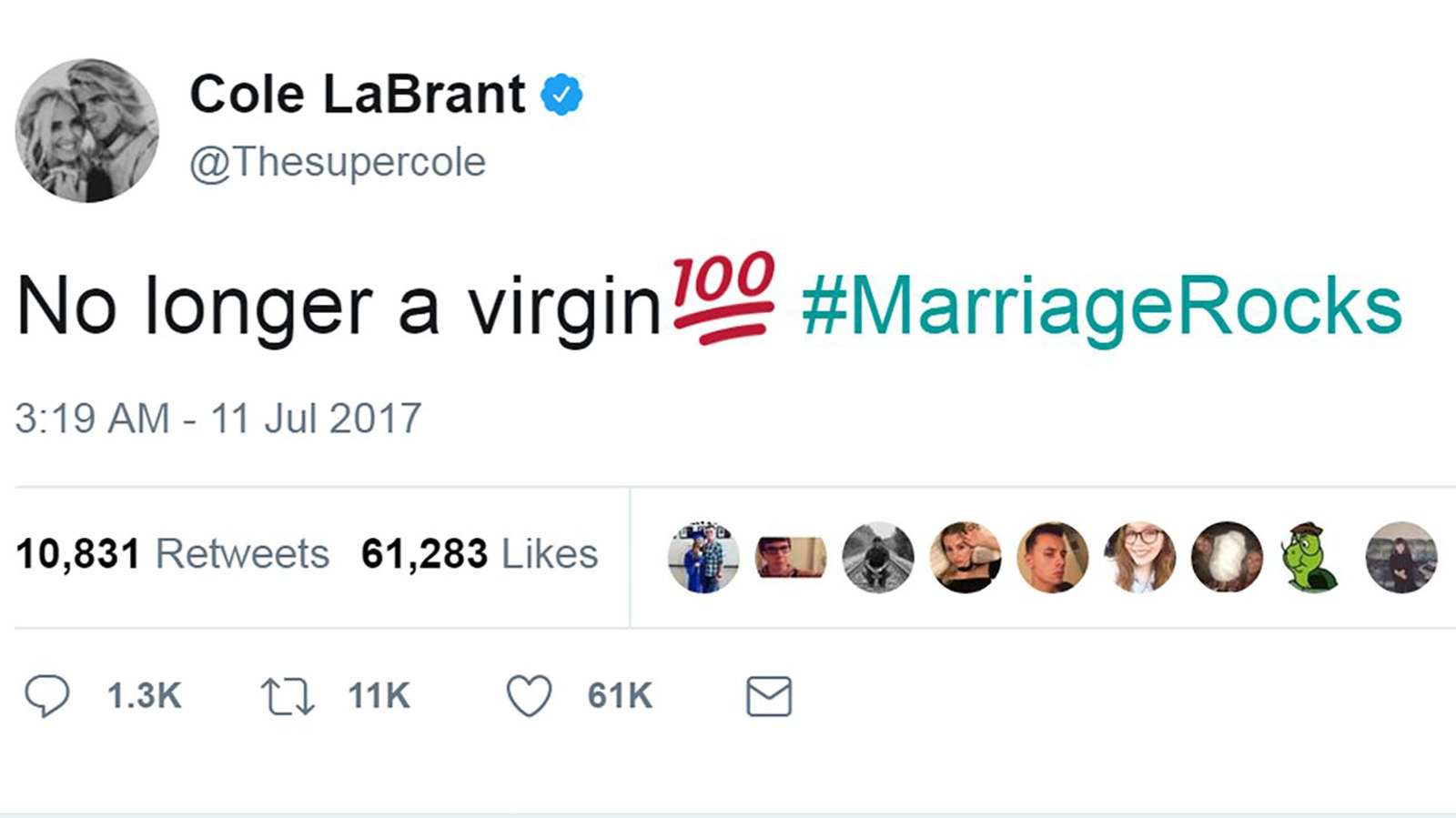A blonde woman opens her mouth and looks up at her equally blonde husband. He sprays a tall swirl of whipped cream into her mouth, and sprinkles chocolate chips on top. He takes a bite of the creamy concoction and the couple perform a brief, out-of-sync dance break to Taylor Swift’s “...Ready For It?” before sharing a closed-mouth kiss.
“We hit teeth so hard,” wrote Bethany Beal, the 33-year-old Christian influencer who posted the video with her husband on Instagram Reels in November 2021. “Keeping things fun and spicy 🔥🥰👏🏻”
There’s no shortage of influencer couples doing vaguely sexy gags on the platform, but this post was a striking departure from Beal’s former content. For 12 years, she encouraged single people to avoid all sexual content (including, for example, watching TV shows and Instagram Reels that mention sex) on Girl Defined, the Christian lifestyle blog and YouTube channel she shares with her sister Kristen Clark. After first going viral in 2021 about how she saved her first kiss for her wedding day at 30, Beal pivoted to content about sex, like selling a $12 PDF with tips for wives on how to talk about it.
Beal and Clark’s content was predominantly known only in Christian circles until YouTuber Cody Ko shared a video of himself and Noel Miller reacting to videos from the Girl Defined YouTube channel such as “Is It OK to Be Obsessed With Guys?” and “Six Guys You Shouldn’t Date, Court, or Marry.” As a result, Redditors and YouTubers called Beal and Clark out as promoters of harmful purity culture.
Beal is one of several purity influencers who are now posting sexual content after years of posts encouraging abstinence and shame around premarital sex. Bailey McKnight, a 22-year-old Mormon who skyrocketed to YouTube fame with her identical twin Brooklyn, shifted to selling vibrators after getting married last year. Chelsea Hurst used to dispense “Christian teen advice” on avoiding sexual situations, and now she’s made multiple videos about her “first time” with her husband, which she described as “joyful ... not painful.”

In November 2021, Brittany Dawn Davis went from posting about being an aspiring wife to being a wife. The Duggar women, who were raised to believe that showing any part of their legs above their ankles could tempt the men around them, transitioned to new modesty standards after getting married. They are now allowed to wear shorts — so long as they adhere to their husbands’ ideas of modesty.
It’s not necessarily inconsistent for Christian women who talk about not having sex before marriage to then start talking about sex after marriage. But the change can be jarring for some followers who are used to the influencers’ pro-abstinence messaging, and the swerve typically happens without any explanation of the transition.
For every response that called Beal’s whipped cream video “a beautiful view of what marriage should be,” other followers found the shift hypocritical.

“Don’t you cater to young girls?” one wrote in the comments. “Y’all are supposed to be reaching out to single Christian girls?!?” another added. “Bethany, will you at least admit that YOU and YOUR SISTER have contributed to the idea that Christians need to appear to be pure in all circumstances? It is fine for you to change your minds — that shows growth and maturity but you are losing a lot of people with this kind of content after what you have preached about,” someone else wrote.
Christian influencers have long leaned into purity culture content, posting tips for abstaining from sex while dating and hacks to make your summer clothes more modest. The word “sex” features frequently in the titles of Girl Defined’s YouTube videos and blog posts, but always as an urge to overcome rather than an experience to celebrate. “Conquering sexual thoughts” and “how to deal with sexual struggles” are common topics.
According to the dictates of purity culture, married Christian men can speak publicly about sex — “No longer a virgin #marriagerocks,” Vine star–turned–Christian family vlogger Cole LaBrant wrote in an infamous 2017 tweet posted during his honeymoon — but the conversation can be more difficult for women. LaBrant’s wife, Savannah, was not a virgin when they got married, as she tearfully admitted in a video titled “The Truth About Savannah’s Past,” and Cole was highly praised by their followers for remaining celibate when they were dating in spite of her confession.

Beal did not respond to a request for comment from BuzzFeed News about her pivot to sex positivity, but she has repeatedly told critics of her posts to “lighten up.” “I’m not going to stop 🛑 If Christian’s don’t talk about a biblical perspective of marriage and sex... who will?” she wrote in a post in January 2022. “I think we’re doing Christian women a MAJOR disservice by being so silent on the topic of sex. It’s not helpful to be so silent. That leaves Christian women turning to the internet for help... and that’s a disaster.”
“I think it’s time for Christians to do a better job with this topic. It’s not a bad topic. It’s not a shameful topic,” Beal wrote in another Instagram post in January. “It’s a God-designed beautiful aspect of our lives. God created sex. He has a lot to say about it in His Word. He’s not embarrassed by the word or the topic. If you’re single, dating or engaged, I strongly encourage you to do a deep dive on a biblical understanding of sexual intimacy.”
But these influencers’ sex-positive content is generally pretty vague — there’s no guidance about which content to read or watch. Followers are left to figure it out themselves, and there is little discussion by Christian influencers about contraception, pleasure, or communicating needs to a partner. Former followers of the purity culture Beal pushed are frustrated that she’s not being held accountable for her own anti-sex messaging, which helps uphold the norm of women not knowing much about sex when they enter marriage.
Maddie, a 24-year-old graduate student (most interviewees requested that their surnames be withheld to protect their privacy), said she has an issue with Beal failing to recognize herself as part of the problem. In a 2017 blog post, Beal and Clark called secular culture “sex-crazed” and condemned what Maddie called “aggressive, bold, and flirtatious” behavior (for example, making the first move).
“She’s [now] framing her social media presence around being a Christian woman who isn’t afraid to talk about sex, and completely ignoring that all she promoted in the last five years was the notion that women could only be fulfilled if they repressed their sexual desires at all costs,” Maddie said. “Historically, you have espoused the same rhetoric you're now trying to counter. It's hypocritical.”
Cayla, a 36-year-old former evangelical who critiques Christian theology on Instagram, told BuzzFeed News that growing up within purity culture involved a “lifetime of indoctrination that sex is bad,” which left her ashamed and uneducated even after she was married. She said it frustrates her that purity culture influencers come across as “innocent.”
“It’s really hard for me when I see accounts like Girl Defined that have really pretty graphics and innocent enough language and Scripture,” Cayla said. “They’re attractive and they are bubbly, and they present it in this way that doesn’t seem harmful. And yet it is, and it applies uneven standards to young girls and to women. And they’re not actually listening to those of us that have been harmed by this movement.”
Sunny, a moderator of the r/FundieSnarkUncensored subreddit, which keeps tabs on fundamentalist religious influencers, told BuzzFeed News they think the posts by former purity influencers about “the clumsy climb out of being a virgin” could be beneficial to young people. But they think it would be better if Beal recognized that “her upbringing in purity culture contributed so much to that difficult transition.”
Encouraging total abstinence from all sexual content before marriage and an obsession with sex the moment after the wedding is a harmful expectation of purity culture. Erin Pritchard, a sex therapist who works with Christian women, told BuzzFeed News that consumers need to be aware that influencers’ content could go in a different direction after a major life change, but said it’s also up to influencers to make sure they aren’t confusing or overwhelming their audiences.
“You’re totally on lockdown until you’re married, but once you’re married, people expect a switch to flip. But that’s not a healthy sex life,” she said. “When Christian women go off and get married, they have higher rates of vaginismus than their peers, and there’s a higher orgasm gap with Christian couples. Women can have PTSD symptoms in their marriages even if they haven’t experienced trauma. That’s how damaging purity culture can be and how important it is for these people to start acknowledging what impact it can have on their audience.”
Culture critic (and former BuzzFeed News writer) Anne Helen Petersen wrote in her newsletter about the “constant warfare” young religious women face, encouraged to orient their entire lives toward a pursuit of a partner while fighting their hormonal urges. She told BuzzFeed News that McKnight, the Mormon twinfluencer who also pivoted to sex positivity within marriage after promoting abstinence, was an example of someone who changed her content more organically by, for example, sharing about the awkwardness of her wedding night.
“She introduced sex positivity the way someone would a boyfriend: gradually, then consistently, but always with a lot of candor,” Petersen said. “She did AMAs, she talked about all sorts of facets of sex positivity [like] pleasure, and occasionally mismatched sex drives. She seemed very happy. The glow-up was not just bronzer.”
Petersen wrote that the small, gradual steps McKnight took “might be quietly changing the parameters of someone else’s world right now, softening the harshness with which they view themselves, their bodies, their desires and their peers.”
“It might be changing the way they think about women’s worth, just generally, and giving them the confidence to figure out what attitude towards sex works for them,” she continued.
Moderator Sunny said it was important to recognize when influencers like Beal were “doing something beneficial.”
“Could it have been better? Yeah, but we can’t sit around waiting for perfection before we encourage her. If we do, then her and many others like her will never take the first steps out,” they told BuzzFeed News. “Still could have done without the dozens of whipped cream videos though.” ●



